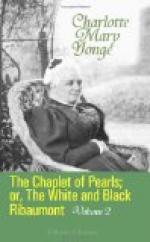He was really not sure that there was not some truth in the professions of the Chevalier being anxious to protect him from the Queen-mother and the Guises; he had never been able to divest himself of a certain trust in his old kinsman’s friendliness, and he was obliged to be beholden to him for the forms in which to couch his defence. At the same time he wrote to Sir Francis Walsingham, and to his grandfather, but with great caution, lest his letters should be inspected by his enemies, and with the less hope of their availing him because it was probable that the Ambassador would return home on the king’s death. No answer could be expected for at least a fortnight, and even then it was possible that the Queen-mother might choose to refer the cause to King Henry, who was then in Poland.
Berenger wrote these letters with much thought and care, but when they were once sealed, he collapsed again into despair and impatience, and frantically paced the little court as if he would dash himself against the walls that detained him from Eustacie; then threw himself moodily into a chair, hid his face in his crossed arms, and fell a prey to all the wretched visions called up by an excited brain.
However, he was equally alive with Philip to the high-spirited resolution that his enemies should not perceive or triumph in his dejection. He showed himself at the noon-day dinner, before Captain Delarue departed, grave and silent, but betraying no agitation; and he roused himself from his sad musings at the supper-hour, to arrange his hair, and assume the ordinary dress of gentlemen in the evening; though Philip laughed at the roses adorning his shoes, and his fresh ruff, as needless attentions to an old ruffian like the Chevalier. However, Philip started when he entered the hall, and beheld, not the Chevalier alone, but with him the beautiful lady of the velvet coach, and another stately, extremely handsome dame, no longer in her first youth, and in costly black and white garments. When the Chevalier called her his sister, Madame de Bellaise, Philip had no notion that she was anything but a widow, living a secular life; and though a couple of nuns attended her, their dress was so much less conventual than Cecily’s that he did not at first find them out. It was explained that Madame de Selinville was residing with her aunt, and that, having come to visit her father, he had detained the ladies to supper, hoping to enliven the sojourn of his beaux cousins.
Madame de Selinville, looking anxiously at Berenger, hoped she saw him in better health. He replied, stiffly, that he was perfectly well; and then, by way of safety, repaired to the society of the Abbess, who immediately began plying him with questions about England, its court, and especially the secret marriage of Queen Elisabeth and ‘ce Comte de Dudley,’ on which she was so minutely informed as to put him to the blush. Then she was very curious about




